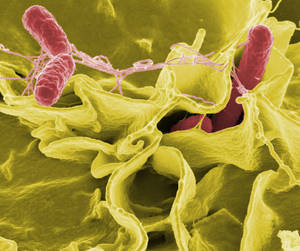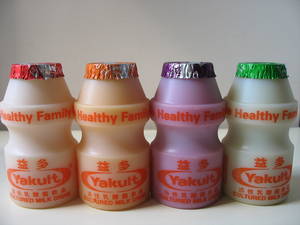Friend or Foe? - Gut Bacteria and Probiotics
Interview with
Kat - Now, you can't turn on the telly without seeing some woman drinking yoghurt and then dancing around for all that she's worth. We're very familiar with the idea of friendly bacteria. Foods, drinks, and supplements that promote healthy gut flora could be found in all the supermarkets. But what are all these about? What are friendly bacteria? How are they different from bad bacteria and what do they actually do? To find out, we're joined by Dr. Karen Scott from Aberdeen University. Hi, Karen.
Karen - Hello.
Kat - Thanks for coming on the Naked Scientists. Now let's get bacterial with this. Tell us about the sort of bacteria that are in our gut. What are they? What are they doing there and how did they get there?
Karen - Well, there's actually a large number of bacteria in the human gut. In fact, we could almost be said to be carrying more bacteria in our bodies than there are actually human cells. These bacteria are very important in helping us to digest the foods that we eat all the time.
Kat - Where do they actually come from? Are we born with these bugs in us?
Karen - Newborn babies are colonised as they're born effectively. So although our guts are actually sterile when babies are in the womb, as soon as they're born they start to pick up bacteria from their mothers or from their environment and we rapidly become colonised by our gut bacteria. The bacteria that are in an infant consuming milk are actually different from those that are in a developed adult. It's around the time of weaning when the types of bacteria that are present start to change. This is because the bacteria composition depends very much on the food that we eat. By the time a child is aged say, 2, 3, 4, they probably have a very similar gut bacteria to an adult.
Kat - Now I'm sure any parents listening will be aware that their child's digestion changes quite significantly at that kind of age, but what are these bacteria actually doing for us in our gut? Presumably, you're talking about the kind of the good bacteria that are helping us out.
Karen - Yeah. I should've said that. Although the bacteria that we hear a lot about in the news are the bad bacteria, the pathogenic bacteria, the vast majority of bacteria that live in our gut are very good for us. They're actually very important to maintain a healthy gut. They help us because, when we eat, much of the food that we eat we are unable to digest ourselves. We don't have the enzymes that are required to degrade much of this food material. When it reaches the colon, the plant fibres for example haven't been digested at all higher up in the gastrointestinal tract, and there we completely depend on our bacteria in our colon to digest these fibres for us, and gain some energy from them.
Kat - So, some of the questions that this throws up to me is how much of our energy is actually coming from bacteria?
Karen - It's thought that about 10% of our energy might come from these gut bacteria. That's not to say that the bacteria are making us fat because the energy is in the form of short chain fatty-acids. These bacteria are carrying out fermentation reactions and these acids that they produce are actually extremely essential for the health of the colon. One of the acids in particular, a compound called butyrate, is protective against colon cancer. In general, having a slightly acidic colon actually prevents the growth of the pathogenic bacteria like E. coli because these bacteria can't grow under acidic conditions. So by maintaining the fermentation that happens by your good bacteria, you can keep out the bad guys that you don't really want in there.
Kat - So what sort of foods are we talking about? Fruit and veg, and that kind of thing?
Karen - Yeah. I mean, it's plant material, carbohydrates and resistant starches. All these sorts of materials reach the colon and are digested by the bacteria that are there. You can actually manipulate the composition of your gut bacteria if you want, by changing your diet. You can do this for better or for worse, depending on which way we change it.
Kat - Now I live with three guys, and I'm well aware of the effects for example, of when they eat things like beans on their guts' activities. So most of the gas that we produce in our guts, is that down to the bacteria?
Karen - Yeah, that's right. I mean, these short chain fatty acids for example are volatile compounds and they are pretty smelly really. Some of the gases that are produced are released in flatulence or oral belching, but that's not to say it's a bad thing. What happens, which is very interesting, is that some of the population have certain bacteria that make smellier farts if you want, whereas other people have a different type of bacteria and they don't tend to be as smelly. So they might be producing just as much gas, but you just can't detect it quite as well it seems.
Kat - I'd say that was the clearly the female half obviously. So you mentioned that we can change the composition of our gut bacteria, say switch it from being some nasty ones to being more good bacteria, and we are bombarded with these ideas that you just drink this little yoghurt drink and that's going to give you all the stuff for your friendly bacteria. What's in these yogurt drinks and do people actually need them? Are they doing us any good?
 Karen - Well that's an interesting one. The yogurt drinks actually contain a bacterium themselves. So, when you consume those yogurt drinks, the manufacturers are actually giving you their bacterium. All these yogurts have slightly different bacteria in them because they're all patented, and each manufacturer has a slightly different bacterium that they put in their drinks. Now these bacteria have all been categorised and they're all very safe. They're not going to do you any harm, but in general terms, you're putting - say one pot of yogurt might contain around 100 million bacteria - and you're putting them in your gut, up against a million, million bacteria. So, they really are outnumbered and I think, in my opinion anyway, it's much better to try and encourage the growth of the bacteria that are already there, so your normal healthy bacteria. You can do that by increasing the intake of carbohydrates and fibre, but the other way that food companies are trying to do this is by introducing what they call prebiotics. The yogurt and stuff that contains the bacteria in the yoghurt are called probiotics. Prebiotics are actually carbohydrate-like compounds that again, we can't digest. They go straight through to our gut and our bacteria that are always there can grow on these prebiotics. They're sort of targeted to help the growth of the good bacteria in our guts.
Karen - Well that's an interesting one. The yogurt drinks actually contain a bacterium themselves. So, when you consume those yogurt drinks, the manufacturers are actually giving you their bacterium. All these yogurts have slightly different bacteria in them because they're all patented, and each manufacturer has a slightly different bacterium that they put in their drinks. Now these bacteria have all been categorised and they're all very safe. They're not going to do you any harm, but in general terms, you're putting - say one pot of yogurt might contain around 100 million bacteria - and you're putting them in your gut, up against a million, million bacteria. So, they really are outnumbered and I think, in my opinion anyway, it's much better to try and encourage the growth of the bacteria that are already there, so your normal healthy bacteria. You can do that by increasing the intake of carbohydrates and fibre, but the other way that food companies are trying to do this is by introducing what they call prebiotics. The yogurt and stuff that contains the bacteria in the yoghurt are called probiotics. Prebiotics are actually carbohydrate-like compounds that again, we can't digest. They go straight through to our gut and our bacteria that are always there can grow on these prebiotics. They're sort of targeted to help the growth of the good bacteria in our guts.
Kat - So it's pretty obvious that we have evolved to have these bacteria and they're helping us digest our food and keep us healthy. Do most people need help with their gut bacteria?
Karen - I think as long as you consume a generally healthy diet and a varied diet, because there are many many different types of bacteria in the gut. There are over 500 different species of bacteria and they all have slightly different 'eating habits' if you want, so as long as you have a generally good healthy diet, then yes, your gut bacteria will be functioning adequately. But sometimes you may inadvertently cause a shift in your bacteria and they may then need a little help to re-establish a good bacterial profile. That's when these probiotic products are actually quite good for you, and I'm talking probably antibiotics is the main thing really there.
Kat - We've started to hear some stories lately on the Naked Scientists about how our gut bacteria may be having a much bigger impact say, on our immune system. Do you think that this kind of area is going to become much more important in the future?
Karen - I mean, it's certainly been established that in a very early life your immune system is sort of primed by your gut bacteria. The immune system is in contact with our normal gut bacteria all the time and it's constantly sampling these bacteria, and it knows not to react to them. It knows not to get inflamed and cause a very big immune response to our normal bacteria. That's how it knows when it encounters something it's not used to, then it can react to that. We need that to happen in order to stop getting sick. This happens from very early life and is part of the hygiene hypothesis, which is where perhaps if you try to stay too clean then you don't get this constant priming of your immune system. In some cases, that may mean that you over react to what should not normally cause a bad reaction.
Kat - Thanks very much for that, Karen. That is Dr. Karen Scott from the Microbial Ecology Group at the University of Aberdeen.









Comments
Add a comment